The Project Gutenberg EBook of Punch, or the London Charivari, Vol. 105,
August 12th 1893, by Various
This eBook is for the use of anyone anywhere at no cost and with
almost no restrictions whatsoever. You may copy it, give it away or
re-use it under the terms of the Project Gutenberg License included
with this eBook or online at www.gutenberg.org
Title: Punch, or the London Charivari, Vol. 105, August 12th 1893
Author: Various
Editor: Sir Francis Burnand
Release Date: May 19, 2011 [EBook #36140]
Language: English
Character set encoding: ISO-8859-1
*** START OF THIS PROJECT GUTENBERG EBOOK PUNCH, OR THE LONDON ***
Produced by Lesley Halamek, Malcolm Farmer and the Online
Distributed Proofreading Team at http://www.pgdp.net
[pg 61]
PUNCH, OR THE LONDON CHARIVARI
VOLUME 105, August 12th 1893
edited by Sir Francis Burnand
THE CLOSURE AT HOME.
Paterfamilias entered the
drawing-room at ten minutes
to six o'clock, and found the
family still undecided. There
was a pause in the conversation
when he made his appearance.
"Where are we to go?" he
asked, taking out his watch.
"You have been quarrelling
for the last week, and I have
given you till this hour. So
get through your amendments
as fast as you can."
"I prefer Paris," said
Materfamilias, "and I am
supported by all the girls.
We are decidedly in a majority."
"Paris is simply awful at
the end of July!" cried the
eldest son. "Give you my
word, mother, the place is
impossible."
"Venice would certainly be
better," said his younger
brother. "Charming place,
and you get a very decent
table d'hôte at Danieli's."
"Oh, Venice is too dreadful
just now!" exclaimed Aunt
Matilda. "If we are to go
with you, we certainly can't
travel there. Besides, there's
the cholera all over the Continent.
Now Oban would be
nice."
"Are you speaking seriously?"
asked Cousin Jane.
"Scotland never agrees with
me, but Cairo would be
perfect."
"Do you think so, my dear
girl?" put in Uncle John.
"I fancy you are making a
mistake. Egypt is very well
in the winter, but it is fearfully
hot in August. Now
they tell me Killarney is
simply delightful at this
season."
"Ireland! No, thank you!"
exclaimed Reginald. "We
have had enough of Home
Rule on this side of the
Channel to go across to find it
on the other. No; give me
Spain, or even Russia."
The hands of the clock were
close upon the hour, but still
there was a minute or so to
spare.
"Russia indeed!" snapped
out Priscilla. "Who ever
would go to Russia? But
people do tell me that Chicago
is well worth seeing, and——"
At this moment the clock
struck six.
"Time's up," cried Paterfamilias.
"We will all go to
Herne Bay."
And they did.
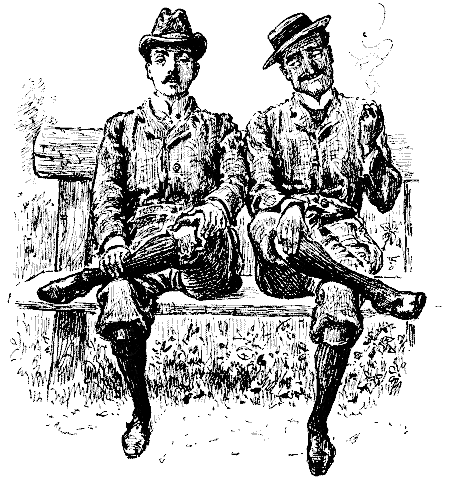
THE TEST OF TRUE GENIUS.
Pictor Ignotus Number One. "Yes; I rather flatter myself there
are precious few of my Contemporaries who care about my Work!"
Pictor Ignotus Number Two (not to be beaten). "By Jove! I
rather
flatter myself I've got the Pull of you there, Old Man! Why,
There's Nobody cares about Mine!"
The New Atomic Theory.
(According to the New Journalism).
Mankind are debtors to two mighty creditors,
Omniscient Science, and infallible Editors.
Nature is summed in principles and particles;
The moral world in Laws and Leading Articles!
CRICKET ACROSS THE CHANNEL.
We believe that our lively neighbours, the French, having seen
that there is a chance of some alteration being made in the rules of
cricket in England, have determined to suggest some changes on
their own account. We give the first list of proposals:—
1. The ball in future is to be made of india-rubber.
2. Armour to be allowed to the striker, so
as to prevent accidents from the ball.
3. The umpires to be henceforth experienced
surgeons, so that their medical services may
be available for the wounded.
4. Camp-stools to be permitted to the long-stop,
and other hard-worked members of the
field.
5. Fielders expected to run after a rapidly-driven
ball, to be allowed to follow the object
on bicycles.
6. The wicket-keeper to have a small portable fortress in front of
him to keep him out of danger.
7. The bats to be made of the same materials as those used in
lawn-tennis.
8. The game to commence with the "luncheon interval," to be
employed in discussing a déjeuner à la fourchette.
9. The uniform of the cricketer in future to consist of a horn, a
hunting-knife, jockey-cap and fishing-boots, in fact the costume of
the earliest French exponent of the game.
10. The outside to have the right to declare the game closed when
fatigued.
11. A band of music to be engaged to play a popular programme.
A flourish of trumpets to announce the triumph of the striker when
he succeeds in hitting the ball.
12. Those who take part in the great game to be decorated with a
medal. All future matches to be commemorated with clasps, to
denote the player's bravery.
Should these reforms be adopted by the M. C. C., there seems little
doubt that the national game of England will receive a fresh lease of
popularity in the land that faces Albion.
THE LATEST CRISIS.
[Mr. Bartley protested in the House of Commons against Mr. W.
O'Brien's conduct in dining in the House with strangers at a table reserved
for Members. Mr. O'Brien explained that Mr. Austen Chamberlain had
taken a table which he (Mr. O'Brien) had previously reserved. The
question is under the consideration of the Kitchen Committee.]
A crisis! A crisis! The man is a fool
Who desires at this moment to talk of Home Rule.
Though we know that in Egypt a something is rotten,
The intrigues of young Abbas are straightway forgotten;
And we think just as much of the woes of Siam
As we care for that coin of small value—a dam.
For a crisis has come, and the House is unable
To detach its attention from questions of table.
Their tongues and their brains all the Members exhaust in
Discussing the rights of O'Brien and Austen.
They debate in an access of anger and gloom
As to who took from which what was kept, and for whom.
The letters they wrote, the retorts they made tartly
Are detailed—gracious Powers preserve us—by Bartley,
Who can bend—only statesmen are formed for such feats—
His mind, which is massive, to questions of seats,
And discuss with a zest which is equal to Tanner's,
The absorbing details of a matter of manners.
Mr. Bartley you like to be heard than to hear
Far more, but, forgive me, a word in your ear.
Though we greatly rejoice when all records are cut
By your steam-hammer mind in thus smashing a nut,
Yet we think it were well if the Kitchen could settle
In private this question of pot versus kettle.
And in future, when dog-like men fight for a bone,
Take a hint, Mr. Bartley, and leave them alone.
Latest from the National Boxing Saloon (with the kind
regards of the Speaker).—"The nose has it, and so have the
eyes!"
[pg 62]
SAINT IZAAK AND HIS VOTARIES.
Mr. Punch's Tercentenary Tribute to the Author of "The Compleat Angler."
[August 9th this year is the 300th anniversary of the birth, in the ancient house at Stafford, of Izaak Walton.]
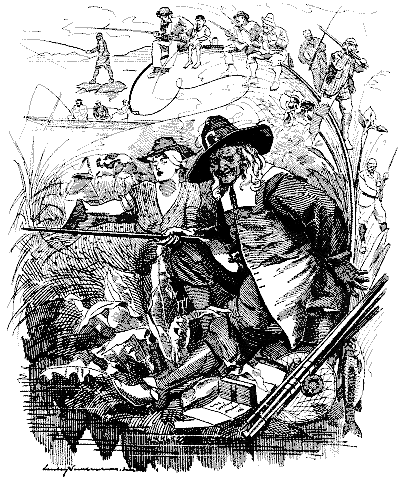
Good Izaak of the diction quaint,
The calendar holds many a fellow
Less worthy to be dubbed a saint
(For gentle heart and wisdom mellow)
Than thou, the Angler's genial guide
By wandering brook and river wide.
"I care not, I, to fish in seas,"
So chirped Will Basse, thy favourite singer,
"Fresh rivers best my mind do please."
Bard-loving quoter, brave back-bringer
Of England's pastoral scenes and songs,
All England's praise to thee belongs.
Thy Book bewitches more than those
Who are sworn "Brothers of the Angle."
Scents of fresh pastures, wilding rose,
All trailing flowers that intertangle
In England's hedgerows, seem to fill
Its pages and our pulses thrill.
[pg 63]
We see the stretch "up Totnam Hil,"
Toward the "Thatcht House" that fresh May morning;
We hear Viator praise the skill
That he was first inclined to scorning;
We mark the Master's friendly proffer
Change him to votary from scoffer.
Those "many grave and serious men,"
He chid as "men of sowr complexions,"
If they resist his graphic pen,
His pastorals sweet, his quaint reflections,
Must have indeed mere souls of earth,
To beauty blind, untuned to mirth.
The "poor-rich-men" he pitied so
All Anglers, and wise hearts, must pity.
His song's queer "trollie lollie loe,"
Sounds cheerily as the blackbird's ditty,
To men in populous city pent,
Who know the Angler's calm content.
And even those who know it not,
Nor care—poor innocents!—to know it,
Whom ne'er the Fisher's favoured lot
Has thrilled as sportsman, fired as poet,
May love to turn the leaves, and halt on
The quaint conceits of honest Walton.
The man whose only "quill" 's a pen,
Who keeps no rod and tackle handy,
May hear thy "merry river" when
"It bubbles, dances, and grows sandy."
May sit beneath thy beech, and wish
To catch thy voice, if not thy fish:
May love to sit or stroll with thee,
Amidst the grassy water-meadows;
The culverkeys and cowslips see,
Dancing in summer's lights and shadows;
And watch yon youngster gathering stocks
Of lilies and of lady-smocks:
To hear thy milkmaid, Maudlin, troll
Choice morsels from Kit Marlow sweetly;
And Maudlin's mother,—honest soul,
Whose "golden age" has fled so fleetly!—
Respond with Raleigh's answering rhyme
Of wisdom past its active prime:
To take a draught of sound old ale—
What tipple wholesomer or sweeter?—
At the old ale-house in the vale,
With Corydon and brother Peter;
And share the "Musick"'s mellow bout,
As they at supper shared the trout.
Then to that cleanly room and sweet—
After a gay good night to all—
Lavender scent about the sheet,
And "ballads stuck about the wall,"
And fall on sleep devoid of sorrow,
With fair dreams filled of sport to-morrow.
What wonder Walton's work has charmed
Three centuries? That his bait has captured
The grey recluse, the boy switch-armed,
The sage, the statesman, bard enraptured,
Gay girl—are fish her only spoil?—
And grave Thames-haunting son of toil!
Thy votaries, good Saint Izaak, are
"All who love quietnesse, and vertue."
Is there on whom such praises jar?
Well, join for once—it scarce can hurt you—
In Punch's Tribute; fortune wishing
To gentle souls who "go a-fishing!"
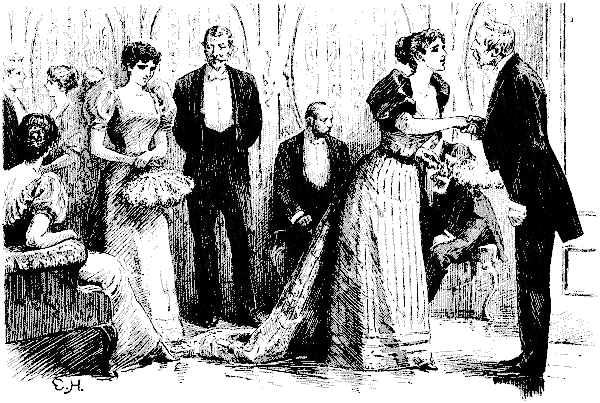
GUESSES AT TRUTH.
Mr. Laidislaw. "Handsome woman our Hostess—don't you think? By the
bye, what do you suppose her Age is?"
Miss St. Cyr. "Well, I should fancy, what the Illustrated Biographies
call 'Present Day!'"
"HERE'S TO THE CLIENT."
Here's to the client who makes his own will,
And here's to his friends who dispute it;
Here's to the case which is drawn up with skill,
And the time that it takes to refute it.
Here's to the felon whose crimes are a score,
And here's to the wretch with but one, Sirs;
Fraudulent trustees, directors galore,
And the various things that they've done, Sirs.
Here's to the costs which will mount up apace,
When the action comes on for a hearing,
"Retainers," "refreshers," and all of their race,
Which they lavish on us for appearing.
Here's to the Law, with its hand just and strong,
Which has grown from the earliest ages;
And here's to this lay, which we hope's not too long
For Punch to put into his pages.
New Version of an Old Saying (adapted
for exclusive swells who cannot enjoy even a
Sport when it becomes "so common, don't-cha!").—What
is Everybody's pleasure is
Nobody's pleasure!
[pg 64]
TO A SWISS BAROMETER.
Oh, optimistic instrument,
No other ever seeks
To raise one's hopes—benevolent
You always show Beau fixe!
Though meteorologic swells
Predict wet days for weeks,
Your well-intentioned pointer tells
Of nothing but Beau fixe.
How sweet, when in the dewy morn—
So dewy!—up the peaks
We start through drizzle all forlorn,
To read again Beau fixe.
It makes us think of sunny lands,
Where weather has no freaks,
To see, they're always so, your hands
Both point to that Beau fixe.
And though we're sodden to the skin,
Through coat and vest and breeks,
You did not mean to take us in
In spite of your Beau fixe.
We tramp, expecting soon to see
In that grey sky some streaks;
Ah no, it's fixed as fixed can be,
As fixed as your Beau fixe.
No matter, we get used to rain,
And mop our streaming cheeks,
Quite sure, when we get home again,
You cannot say Beau fixe.
At last, all soaked, we stagger in—
One's clothing simply leaks—
And still you say, through thick and thin,
Unchangeably Beau fixe.
We change, although you don't; no thread
Is dry on us; small creeks
Form where we stand, all drenched from head
To foot. Blow your Beau fixe!
This beastly weather might have riled
The philosophic Greeks;
It makes us simple Britons wild,
Combined with your Beau fixe.
We tell the landlord we must go—
Poor man, he rather piques
Himself upon the weather, so
Incessantly Beau fixe.
"Ah, non, ça va changer ce soir!"
Thus hopefully he speaks,
"Si Monsieur voulait bien voir
Le baromètre—Beau fixe!"
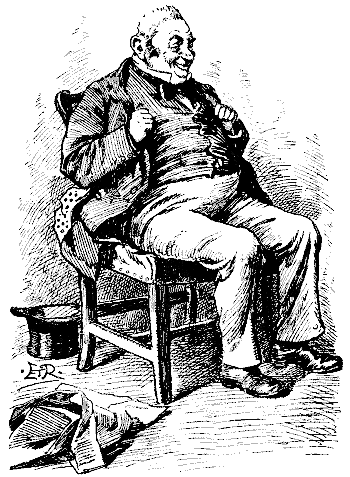
AN AUTHORITY ON THE THEORY AND PRACTICE OF THE "BUFFER STATE"!!
Adapted.
(To the Unionist Needs of the
Moment.)
Other men have many faults,
Mr. Gladstone has but two;
There's nothing wise that he can say,
and nothing right that he can do.
In a recent case, Mr. Lane,
the magistrate, is reported to
have informed an inquiring
husband, "If your wife turns
you out she is not bound to find
you a home; but if you turn
your wife out you are bound to
find her a home." This suggests
a new Charity, "The Home for
Turned-out Wives." These ladies
would be seen driving out in
well-appointed traps, and gain
a new status in Society as being
"uncommonly well-turned-out"
wives.
ANOTHER SCENE AT THE PLAY.
(That never should be tolerated.)
Scene—Auditorium of a Fashionable Theatre. Vast majority of
the audience deeply interested in the action and dialogue of an
excellent piece. Enter a party of Lady Emptyheads into a
Private Box.
First Emptyhead (taking off her wraps). I told you there was no
necessity to hurry away from dinner. You see they are getting on
very well without us.
Second Empt. (seating herself in front of the box). Yes. And it's
so much pleasanter to chat than to listen. This piece, they tell me,
is full of clever dialogue—so satisfactory to people who like that sort
of thing.
Third Empt. (looking round the house with an opera-glass). Why
scarcely a soul in the place we know. Well, I suppose everybody is
leaving town. Stay, is that Mrs. Evergreen Toffy?
Fourth Empt. (also using her glasses). Why, yes. I wish we
could make her see us.
First Empt. Haven't you noticed that you never can attract
attention when you want to? Isn't it provoking?
Second Empt. Oh, terribly; and there is Captain Dashalong.
Why, I thought he was at Aldershot.
Third Empt. Oh, they always give them leave about this time of
the year.
Rest of Audience (sternly). Hush! S-s-s-h-s-h!
Fourth Empt. I wonder what's the piece about.
Third Empt. Oh, it doesn't in the least matter. Sure to be
sparkling. Do you like that woman's hair?
Fourth Empt. Scarcely. It's the wrong shade. How can people
make such frights of themselves!
First Empt. I wonder if this is the Second Act, or the First!
Third Empt. What does it matter! I never worry about a
piece, for I know I shall see all about it afterwards in the
papers.
Rest of Audience (with increased sternness). Hush! S-s-s-h-s-h!
Second Empt. I always come to this theatre because the chairs are
comfortable. What is the good of going to the play unless you can
enjoy yourself?
Third Empt. Quite so. And it's much better fun without one's
husband, isn't it?
First Empt. Of course. I never bring mine, because he always
goes to sleep! So disrespectful to the actresses and actors!
Second Empt. Yes. Of course, one ought to listen to what's going
on, even if you don't care what it's all about.
Fourth Empt. Quite so. Not that it isn't pleasant to look round
the house.
Rest of Audience (angrier than ever). Hush! S-s-s-h-s-h!
Third Empt. Yes, I often think that this side of the curtain is
quite as amusing as the other.
Fourth Empt. I wonder what they are doing on the stage? Oh, I
see that the Act is nearly over! Well, I daresay it has been very
amusing.
Rest of Audience (furious). Hush! Hush! Hush!
First Empt. There descends the curtain! By the way, what a
noise those people in the pit have been making! I wonder what it
was all about?
Second Empt. I haven't the faintest notion. However, when the
play begins again, I hope they won't make any more noise. It is so
disrespectful to the Audience.
First Empt. And the Company. Why can't people behave themselves
in a theatre?
Second, Third, and Fourth Empt. (in chorus). Ah yes! Why
can't they?
[Scene closes in upon a renewal of chatter upon the raising of the
Curtain on another Act.
"Give a Day a Bad Name and——."—It is stated that the day
of the disgraceful Donnybrook in the House of Commons has been
nicknamed "Collar Day," because Mr. Hayes Fisher seized
Mr. Logan by the collar, and Mr. Chamberlain "collared"
Mr. O'Brien's table in the dining-room. This is all very well in
its way, but would not "Choler Day" be more appropriate and
intelligible?
[pg 65]
A DREAM-BOOK
For Would-be Travellers.
If you dream of—
- Antwerp. Remember the
Reubens and forget the passage
over.
- Boulogne. Remember the
Casino and forget the Port.
- Calais. Remember the Restaurant
at the station and
forget the dull surroundings.
- Dieppe. Remember the
Plage and forget the occasional
gales.
- Etretat. Remember the
sands and forget the prices.
- Florence. Remember the
pictures and forget the heat.
- Geneva. Remember the lake
and forget the city.
- Heidelberg. Remember the
castle and forget the climbing.
- Interlachen. Remember the
Jung Frau and forget the tourists.
- Japan. Remember the interesting
associations and forget
the length of the journey.
- Lisburn. Remember that it
is little known and forget that
it is not worth seeing.
- Madrid. Remember that
you can get there in two days
and forget that you will regret
the time you spend upon the
trip.
- Naples. Remember that
you should see the Bay and
forget that you are expected
to die immediately afterwards.
- Paris. Remember that it
is always pleasant and forget
that the exception is during
August.
- Quebec. Remember it's in
Canada and forget that it's
the least pleasing place in
America.
- Rome. Remember its objects
of interest and forget its
fever.
- Strasbourg. Remember that
it has a Cathedral and forget
that the clock is a fraud.
- Turin. Remember that it
might be quite worth the
journey and forget that it
isn't.
- Venice. Remember its canals
and forget its odours.
- Vichy. Remember that
there is a good hotel and forget
that you have been there
a dozen times before.
- Wiesbaden. Remember the
glories of its past and forget
the sadness of its present.
- Zurich. Remember that it
is completely abroad and forget
that there's no place like
home.
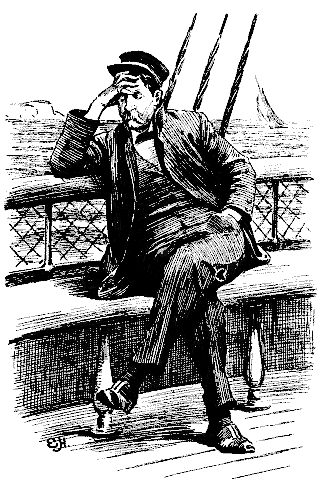
GOOD RESOLUTIONS.
Blenkinsop (on a Friend's Yacht) soliloquises. "I know one thing, if
ever I'm rich enough to keep a Yacht, I shall spend the Money
in Horses."
ONLY THEIR PLAY!
Abnormal natures, morbid motives! Yes!
These things, upon the stage, perhaps impress.
Monstrosities, not true men's hearts, nor women's.
Trolls, with a touch of the delirium tremens,
Neurotic neurospasts, puppets whose wires
Are pulled by morbid dreams and mad desires;
Not men and women 'midst our world's temptations,
But fevered phantasy's bizarre creations.
Despite Solness and Mrs. Tanqueray,
"People don't do these things"—except in play!
As in a Glass Darkly.—Grubby
and grovelling "Realists"
boast that they only
"hold the mirror up to Nature."
Perhaps! But when their particular
"mirror" happens to
be—as it commonly is—dirty
and distorting, Nature, like
the victim of a bad looking-glass
at a country inn, is
taken at a disadvantage.
There are mirrors which make
a man look a monster, but then
the monstrosity is not in the
man but the mirror.
TIMON ON BIMETALLISM.
(Adapted from Shakspeare.)
["He advocates bimetallism with the passionate
ardour of a prophet promulgating a new revelation.
On most subjects he is cool, analytical, and
perhaps a little cynical; but on this subject he is
an enthusiast."—The Times on Mr. Balfour's
Speech about Bimetallism.]
Timon of London, loquitur:—
The learned pate
Ducks to the golden fool; all is oblique;
There's nothing level in our currency
But monometallism! Gold doth lord
Great lands, societies, and throngs of men.
That the sun rounds the earth, that earth's a disc,
Are foolish fads that Timon much disdains
As duping dull mankind. But will they rank
My fad—Bimetallism—along with such?
I seek a dual standard; gold alone
Is a most operant poison! What is here?
Gold? yellow, precious, glittering gold? No, gods,
I am no aureate votarist. Silver seems
To me, and to wise Walsh, a fair twin-standard
Fit to set up, that variable values
May find stability in dual change,
With a fixed ratio, which the world must find,
Or our one standard, like a pirate's flag,
Will lead us to disaster. Monometallism
Is—Monomania. This yellow slave
Will break, not knit, our Commerce. I can be
Cool, analytical, even cynical
On trifles—such as Separatism's sin,
Or County Council Crime; but this thing stirs
My tepid blood, e'en as Statistics warm
The chilly soul of Goschen. Come, curst gold,
Thou common ore of mankind, that putt'st odds
Among the rout of nations, I will make thee
Take thy right place! Thou mak'st my heart beat quick,
But yet I'll bury thee: thou'lt go, strong thief,
Orthodox keepers of thee cannot stand
Against a passionate prophet's promulgation
Of a new economic revelation.
"Put up your gold!" But put up silver, too,
(As Walsh, and Grenfell, and Sage Chaplin urge),
Or banded Europe—some day—shall smash up
Our City to financial chaos. Aye!
I may talk lightly about trivial things,
And cynically smile on twaddle's trifles,—
Union of hearts, optimist ecstasies,
Fervours, and faiths, the breeks of prisoned Pats,
Coercion's bondage and such bagatelles—
But on this Titan theme—Bimetallism—
Timon is in hot earnest!
A Short Way with Wasps.
A plague of wasps infests the South
In consequence of the hot season!—
Humph! Is it torrid heat and drouth
Deprive our Commons of cool reason?
A plague of wasps infests the House!
Its managers the matter mull, for
They have not (like poor Hodge) the nous
To smoke pests out with (moral) sulphur!
To check Hayes Fisher's style, or Tim's tone,
Mellor tries treacle; he needs brimstone.
[pg 66]
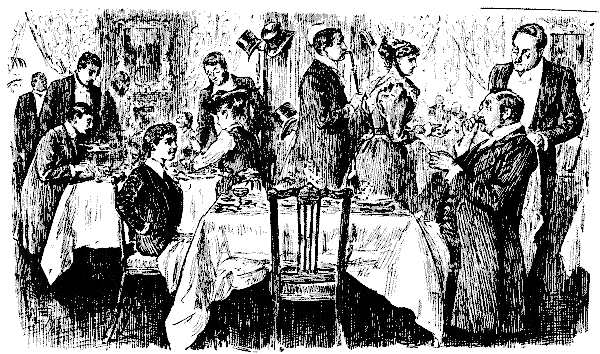
A LESSON.
Father (on receiving Bill for Luncheon at one of our very modern
London Restaurants). "Hallo! What!! Over Two Guineas for
merely——! Why, hang it——!"
His Son (small Etonian). "Oh, well never mind, Father. It's a
Thing to do Once, and we won't do it again!"
THE STORMY PETREL.
["This bird has long been celebrated for the
manner in which it passes over the waves, pattering
with its webbed feet and flapping its wings so
as to keep itself just above the surface. It thus
traverses the ocean with wonderful ease, the billows
rolling beneath its feet and passing away
under the bird without in the least disturbing it."—Wood's
Popular Natural History.]
Only a Petrel, I,
Telling the storm is nigh;
Fleet o'er the waves I fly,
When skies look stormy.
When things are calm and slow,
I 'midst Brum rocks lie low;
But when wild breezes blow
Men may look for me.
Lured from my Midland home,
When gales begin to roam
Proudly I skim the foam,
Flappering and pattering!
I with the airiest ease
Traverse the angriest seas
Round the wild Hebrides
Bellowing and battering.
But the wild Irish coast
Suits my strong flight the most.
Breeze-baffling wings I boast,
Nothing disturbs me.
Cool 'midst the tempest's crash,
Swift through the foam I dash,
Wind flout or lightning flash
Scares not, nor curbs me.
Sea-birds are silly things,
Squat bodies, stunted wings.
Where is the bard who sings
Penguin or puffin,
Grebe, guillemot, or gull?
Oh, the winged noodles, null,
In timid flocks and dull,
Squattin' and stuffin'!
I, like the albatross,
Love on the winds to toss,
Where gales and currents cross
My fodder finding.
Let Gulls and Boobies rest
Safe in a sheltered nest,
I'm bold the breeze to breast
Tamer fowl blinding.
Only a Petrel, I,
Calm in a calm I lie,
But when 'neath darkening sky
Strife lifteth her face,
When the red lightnings glare,
Then, from my rocky lair
Darting, I cleave the air,
Skimming sea's surface.
Some swear the storm I raise;
That's superstition's craze;
But on tempestuous days,
Wild, wet, and windy,
Herald of storm I fly.
Only a Petrel, I,
But when my form you spy,—
Look out for shindy.
"Benefits Forgot."—This is the title of
a serial in Scribners'. Many over-strict persons
will not read it, being under the impression
that the story is essentially theatrical.
A natural mistake. Nothing in an actor's
life could give occasion for more bitter
reflection than the memory of "Benefits
Forgot," especially after they had been got
up and advertised at great personal expense.
TO A FINE WOMAN.
(By a Little Man.)
"Can my eyes reach thy size?"
Asked the Lilliputian poet,
As I've read. Can my head
Reach your shoulder? It's below it.
Women all are so tall
Nowadays, but you're gigantic;
One so vast, sweeping past,
Makes my five feet four feel frantic.
Each girl tries exercise,
Rows, rides, runs, golf, cricket, tennis,
Games for an Olympian—
Greek Olympia, not "Venice."
Stalks and shoots, climbs in boots
Like a navvy's not a dandy's,
Ice-axe takes, records breaks—
If not neck—on Alps or Andes.
Alps in height, girls affright
Men, like me, of puny figure;
They are too tall, but you
Are preposterously bigger.
At this dance, if I glance
Round the room, I see I'm smallest;
You instead are a head
Over girls and men, you're tallest.
As a pair, at a fair,
Any showman might produce us;
Dwarf I'd do, giant you——
What! They want to introduce us?
Can I whirl such a girl?
Calisthenics could not teach it.
I, effaced, clasp your waist?
I'll be hanged if I can reach it!
[pg 67]
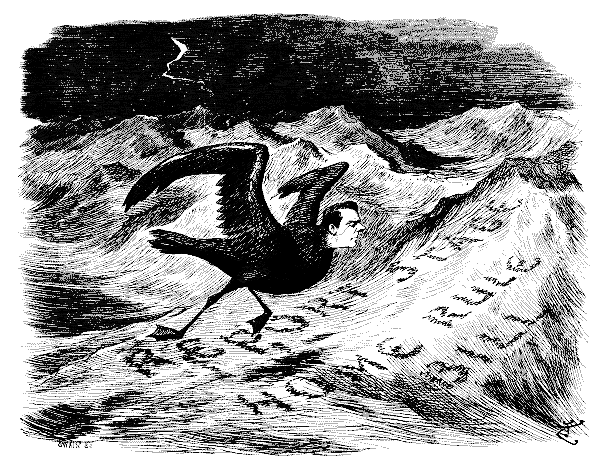
THE STORMY PETREL!
[pg 69]
THE ADVENTURES OF PICKLOCK HOLES.
(By Cunnin Toil.)
No. I.—THE BISHOP'S CRIME.
I was sitting alone in my room at 10.29 on the night of the
14th of last November. I had been doing a good deal of work
lately, and I was tired. Moreover, I had had more than one touch
of that old Afghan fever, which always seemed to be much more
inclined to touch than to go. However, we can't have everything
here to please us; and as I had only the other day attended two
bankers and a Lord Mayor for measles, I had no real cause to
complain of my prospects. I had drawn the old armchair in which
I was sitting close to the fire, and, not having any bread handy, I
was occupied in toasting my feet at the blaze when suddenly the
clock on the mantelpiece struck the half hour, and Picklock
Holes stood by my side. I was too much accustomed to his
proceedings to express any surprise at seeing him thus, but I own
that I was itching to ask him how he had managed to get into my
house without ringing the bell. However, I refrained, and motioned
him to a chair.
"My friend," said this extraordinary man, without the least preface,
"you've been smoking again. You know you have; it's not the least
use denying it." I absolutely gasped with astonishment, and gazed at
him almost in terror. How had he
guessed my secret? He read my
thoughts, and smiled.
"Oh, simply enough. That spot on
your shirt-cuff is black. But it might
have been yellow, or green, or blue, or
brown, or rainbow-coloured. But I know
you smoke Rainbow mixture, and as your
canary there in the corner has just gone
blind, I know further that bird's-eye is
one of the component parts of the mixture."
"Holes," I cried, dropping my old
meerschaum out of my mouth in my
amazement; "I don't believe you're a
man at all—you're a devil."
"Thank you for the compliment," he
replied, without moving a single muscle
of his marble face. "You ought not to
sup——" He was going to have added
"pose," but the first syllable seemed to
suggest a new train of thought (in which,
I may add, there was no second class
whatever) to my inexplicable friend.
"No," he said; "the devilled bones
were not good. Don't interrupt me; you
had devilled bones for supper, or rather
you would have had them, only you didn't like them. Do you see that
match? A small piece is broken off the bottom, but enough is left
to show it was once a lucifer—in other words, a devil. It is lying at
the feet of the skeleton which you use for your anatomical investigations,
and therefore I naturally conclude that you had devilled
bones for supper. You didn't eat them, for not a single bone of the
skeleton is missing. Do I make myself clear?"
"You do," I said, marvelling more than ever at the extraordinary
perspicacity of the man. As a matter of fact, my supper had consisted
of bread and cheese; but I felt that it would be in extremely
bad taste for a struggling medical practitioner like myself to contradict
a detective whose fame had extended to the ends of the earth.
I picked up my pipe, and relit it, and, for a few moments, we sat in
silence. At last I ventured to address him.
"Anything new?" I said.
"No, not exactly new," he said, wearily, passing his sinewy hand
over his expressionless brow. "Have you a special Evening
Standard? I conclude you have, as I see no other evening papers
here. Do you mind handing it to me?"
There was no deceiving this weird creature. I took the paper he
mentioned from my study table, and handed it to him.
"Now listen," said Holes, and then read, in a voice devoid of
any sign of emotion, the following paragraph:—"This morning, as
Mrs. Drabley, a lady of independent means, was walking in
Piccadilly, she inadvertently stepped on a piece of orange-peel, and
fell heavily on the pavement. She was carried into the shop of
Messrs. Salver and Tankard, the well-known silversmiths, and it
was at first thought she had broken her right leg. However, on
being examined by a medical man who happened to be passing,
she was pronounced to be suffering from nothing worse than a
severe bruise, and, in the course of half-an-hour, she recovered
sufficiently to be able to proceed on her business. This is the
fifth accident caused by orange-peel at the same place within the
last week."
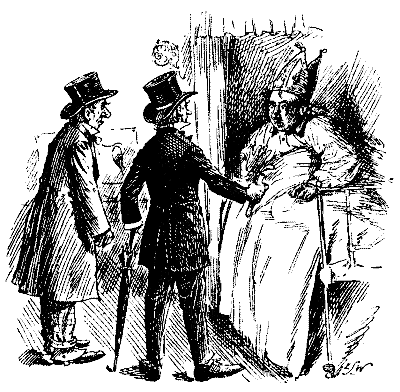
"The Bishop was in his night-gown, and the sight of
two strangers visibly alarmed him."
"It is scandalous!" I broke in. "This mania for dropping orange-peel
is decimating London. Curiously enough I happen to be the
medical man who——"
"Yes, I know; you are the medical man who was passing."
"Holes," I ejaculated, "you are a magician."
"No, not a magician; only a humble seeker after truth, who
uses as a basis for his deduction some slight point that others are
too blind to grasp. Now you think the matter ends there. I don't.
I mean to discover who dropped that orange-peel. Will you help
me?"
"Of course I will, but how do you mean to proceed? There must
be thousands of people who eat oranges every day in London."
"Be accurate, my dear fellow, whatever you do. There are
78,965, not counting girls. But this piece was not dropped by
a girl."
"How do you know?" I asked.
"Never mind; it is sufficient that I do know it. Read this,"
he continued, pointing to another column of the paper. This is
what I read:—
"Missionary Enterprise.—A great conference of American and
Colonial Bishops was held in Exeter Hall this afternoon. The proceedings
opened with an impassioned speech from the Bishop of
Florida——"
"Never mind the rest," said Holes, "that's quite enough.
Now read this":—
"The magnificent silver bowl to be
presented to the Bishop of Florida by
some of his English friends is now on
view at Messrs. Salver and Tankard's
in Piccadilly. It is a noble specimen of
the British silversmith's art." An elaborate
description followed.
"These paragraphs," continued Holes,
in his usual impassive manner, "give
me the clue I want. Florida is an
orange-growing country. Let us call on
the Bishop."
In a moment we had put on our hats,
and in another moment we were in a
Hansom on our way to the Bishop's
lodgings in Church Street, Soho. Holes
gained admittance by means of his skeleton
key. We passed noiselessly up the
stairs, and, without knocking, entered the
Bishop's bedroom. He was in his night-gown,
and the sight of two strangers
visibly alarmed him.
"I am a detective," began Holes.
"Oh," said the Bishop, turning pale.
"Then I presume you have called about
that curate who disappeared in an alligator
swamp close to my episcopal palace
in Florida. It is not true that I killed him. He——"
"Tush," said Holes, "we are come about weightier matters.
This morning at half-past eleven your lordship was standing
outside the shop of Salver and Tankard looking at your presentation
bowl. You were eating an orange. You stowed the
greater part of the peel in your coat-tail pocket, but you dropped,
maliciously dropped, one piece on the pavement. Shortly afterwards
a stout lady passing by trod on it and fell. Have you anything
to say?"
The Bishop made a movement, but Holes was before-hand with
him. He dashed to a long black coat that hung behind the door,
inserted his hand deftly in the pocket, and pulled out the fragmentary
remains of a large Florida orange.
"As I supposed," he said, "a piece is missing."
But the miserable prelate had fallen senseless on the floor, where
we left him.
"Holes," I said, "this is one of your very best. How on earth
did you know you would find that orange-peel in his coat?"
"I didn't find it there," replied my friend; "I brought it with
me, and had it in my hand when I put it in his pocket. I knew
I should have to use strong measures with so desperate a
character. My dear fellow, all these matters require tact and
imagination."
And that was how we brought home the orange-peel to the
Bishop.
Ben Trovato.
A penny-a-liner heard—with a not unnatural choler—
That he of all invention was apparently bereft;
And so he up and told them that a smart left-handed bowler,
"Manipulates the leather with the left!"
That's very chaste and novel, and alliterative too;
As a sham Swinburnian poet we should think that man might do!
[pg 70]
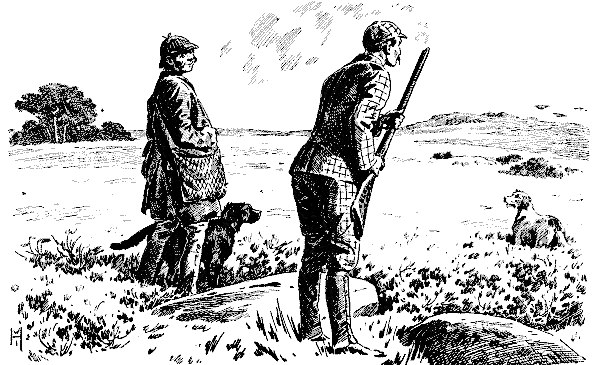
EDUCATED.
(From a Yorkshire Moor.)
Keeper (to the Captain, who has missed again, and is letting off steam in
consequence). "Oh dear! Oh dear! It's hawful to see yer
missin' of 'em, Sir; but"—(with admiration)—"ye're a Scholard
i' Langwidge, Sir!"
CRICKET CONGRATULATIONS.
843! Well done! Well played! Well hit!
It opens Mr. Punch's eyes a bit
To see our friends of the Antipodes
Pile up their hundreds with the utmost ease.
Bruce leads the way, and shows Blues—Dark and Light—
Left-handed men may play the game aright.
Then Bannerman, safe as a Gunn is he,
Exceeds the Century by thirty-three,
While five more than a hundred runs are due
To Trumble, whom his friends call simply "Hugh."
Well played, Australia! Banks may fail—they do,
And, truth to tell, you have lost one or two,
But this at any rate's a clear deduction—
Your Cricket Team can need no reconstruction!
ESSENCE OF PARLIAMENT.
EXTRACTED FROM THE DIARY OF TOBY, M.P.
House of Commons, Monday, July 31.—No one who chanced last
Thursday to see Hayes Fisher and Logan engaged in controversy
on Front Opposition Bench would suspect them of essentially
retiring disposition. This conclusively proved to-night. Decided
on further consideration that something must really be done in
direction of modifying effects of Thursday's riot. Someone must
apologise. This put to Hayes Fisher, who delighted Walrond
with swiftness, even enthusiasm, of acquiescence.
"Right you are, dear boy," he cried. "I have thought so from
the first. Indeed I have publicly placed the matter in its true light.
Daresay you read my little affidavit written within an hour of what
I quite agree with the Speaker in alluding to as 'the regrettable
incident.' Here's what I said: 'To put a stop to his (Logan's)
aggressive conduct, I immediately seized him by the neck and
forcibly ejected him on to the floor of the House. That began the
scrimmage.' Then I go on to point the moral, though indeed it
points itself. This is where you and I particularly agree. 'In my
opinion the responsibility for the discreditable scene rests even more
with Mr. Gladstone than with Mr. Logan.' Yes,
Walrond, you
are quite right in what you are about to say. I have shown clearly
that Mr. G. was at the bottom of the whole business, and he should
apologise. Don't you think he'd better be brought in at the Bar?
And if he spent a night or two in the Clock Tower it would have
most wholesome effect, vindicate dignity of House, and prevent
recurrence of these regrettable scenes."
Walrond's face a study, whilst Hayes Fisher, carried away
by enthusiasm of moment, rubbed his hands and smiled in anticipation
of the scene.
The Opposition Whip had tough job in hand. To Fisher's logical
mind the proposal that he should apologise was a non sequitur.
Why, what had he done? As he told House later, seeing Logan
come up and sit down on bench below him, he thought he was going
to strike him. Natural attitude for a man meaning to let out
straight from the shoulder at another is to sit down with back turned
towards intended victim. Fisher's quick intelligence taking whole
situation in at glance, he promptly proceeded to take in as much as
his hands would hold of the back of Logan's neck, with intent to
thrust him forth. That, as he wrote, "began the scrimmage."
In other words, Mr. Gladstone was responsible for the whole
business, even more so than Logan, who had wantonly brought the
back of his neck within reach of Fisher's hand.
However, there were reasons of State why the guilty should go
unpunished. Not the first time Innocency has been sacrificed that
Guilt might stalk through the land unfettered. Fisher would
apologise; but here again the untameably logical mind asserted
itself. Logan must apologise first. It was he who had been forcibly
ejected. On Thursday night Fisher had come up behind him;
argal, he must follow him now. Thus it was settled, or so understood.
But when critical moment arrived, House waiting for someone
to speak, hitch occurred. Fisher waited for Logan;
Logan, in
excess of politeness, hung back. Awkward pause. Speaker
observed he had certainly understood something might be said by
the two gentlemen. Another pause. Logan and Fisher eyed each
other across the floor.
Lord Chatham, with his sword drawn,
Stood waiting for Sir Richard Strachan;
Sir Richard, longing to be at 'em,
Stood waiting for the Earl of Chatham.
[pg 71]
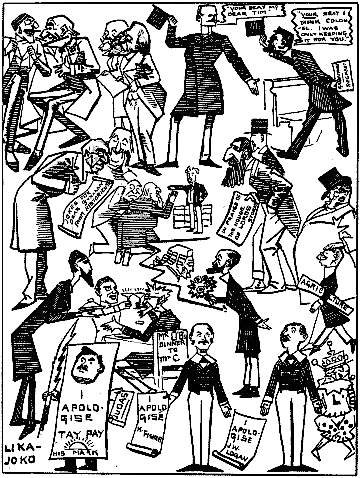
"THE HAPPY FAMILY."
(By Our Artist in Fret-Work.)
At length Prince Arthur interposed; gently, but firmly, drew
the coy Fisher to the front. His apology followed by one from the
lingering Logan. Scene ended amid mutual tears.
"Yes, it's all very well," said Fisher, wringing his
pocket-handkerchief
and glaring angrily at Mr. G. "But, after all, the real
criminal has escaped, and logic, as applicable to events of daily life,
has received a staggering blow."
Business done.—Acland explained English Education Estimates
in speech admirable alike in matter and manner.
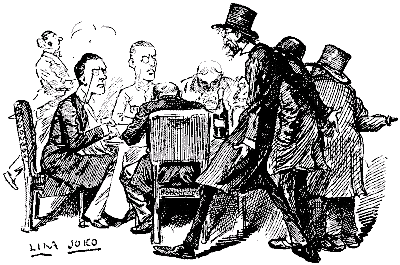
Another Injustice to Ireland.
Tuesday.—Some men are born to trouble as the sparks fly upwards.
Of these is William O'Brien. It would seem that fate had
expended its malignity when Prince Arthur deprived him of his
breeches. Now Joseph has appropriated his dinner-table. The
lynx eye of Bartley detected the irregularity which disclosed
existence of this fresh outrage. Bartley favourably known in House
as guardian of its honour and dignity. From time to time spirit
moves him suddenly to rise and point fat forefinger at astonished
Mr. G., whom he has discovered in some fresh design upon stability
of the Empire or symmetry of the Constitution. At stated hours,
formerly on Thursdays ten o'clock now generally on stroke of
midnight, he is seen and heard shouting "Gag! gag!"
"Odd," says Member for Sark, "how phrases change in similar
circumstances though at different epochs. When Closure first
invented, put in motion by dear Old Morality, and supported
by Bartley, Hanbury, Jimmy Lowther, and the rest, it
used
to be spoken resentfully of as 'pouncing.' Now it is 'gagging.'
But it is precisely the same, inasmuch as the minority
of the day, against whom it is enforced, denounce it as iniquitous,
whilst the majority, who took that view when they were on
other side of House, now regard it as indispensable to conduct
of public business. Bartley having lived through both epochs
is useful illustration of this tendency. When Old Morality
pounced on Irish members his lusty shout of approval used
to echo through House with only less volume than now his roar
of anguish goes up to glass roof when Old Morality's original
thumbscrews are fitted on him and his friends. A quaint,
mad world, my Toby."
To-night Bartley not so well-informed on subject as usual.
Thought it was John Dillon, who, acting the part of
Amphitryon,
piloted his guests within preserves of members' private
dining-room. Turned out it wasn't Dillon at all, but William
O'Brien, who in most tragic manner tells how, having secured
in advance a table for his guests, found when the dinner-hour
struck Joseph and his Brethren seated thereat, merrily profiting
by his forethought. Straightway O'Brien led his guests to
the table in members' room which Unionist Leaders have
marked for their own. This he appropriated, and there,
regardless of surprised looks from ex-ministers at adjoining
table, he truculently dined.
"Well, at any rate," said Tim Healy, that Man of Peace,
"I'm glad it wasn't mere English or Orangemen who were
thus treated. If Joseph had appropriated Saunderson's table,
the Colonel would have taken him in his arms, dropped him outside
on the Terrace, and, returning to his seat, ordered a fresh plate
of soup." Business done.—Bartley adds fresh dignity to
Parliamentary
debate.
Thursday.—Was it this day week the House was in volcanic upheaval,
with Hayes Fisher—or was it Mr. Gladstone?—clutching
Logan by the back of the neck, a mad mob mauling each other
round the white waistcoat of Edward of Armagh? According to
the almanack this is so; according to appearances an eternity and
a hemisphere divide the two scenes.
In Committee on Vote on Account; average attendance from twenty
to thirty. Orders bristle with amendments; papers read in support
of them; occasionally a Member follows with observations on topic
suggested; sometimes he doesn't; then next gentleman who has
prepared paper takes the floor; the audience turns over; goes to
sleep again; wakened by Chairman putting question "that Amendment
be withdrawn." Isn't even vigour sufficient to induce a division.
Only person free from somnolent influence of hour is Mr. G. Has
nothing to do in this galley; looks on wistfully whilst
Lowther (not Jimmy) talks about Vitu and the Pamirs;
Jimmy (lui même) is sarcastic on subject of Board of
Trade engaging in experiments in journalism; and
Dicky Temple wants to know all about reported modifications
in constitution of St. Paul's School by the
Charity Commissioners. Mr. G. liked to have offered few
remarks on one or all these subjects. Tommy Bowles
nearly succeeded in drawing him. Dropping lightly out
of Siam, viâ Morocco, upon question of Collisions at Sea,
Tommy brought Mundella into full focus and fairly
floored him with a problem.
"Suppose," he said, "the right hon. gentleman were
at sea, and the whole fleet bore down upon him on the
weather bow. What would he do?"
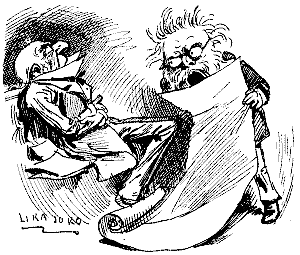
Reading the G. O. M. to sleep.
Mundella nonplussed. Mr. G. knew all about it;
would have answered right off and probably silenced
even Tommy with proposition of counter manœuvre. But
Marjoribanks kept relentless eye on him. Vote on
Account must be got through Committee to-night.
The less speaking the better; so with profound sigh
Mr. G. resisted the temptation and composed himself
to listen to Leng's paper on the prohibition of importation
of live cattle from Canada. Here was opportunity
of learning something which Mr. G. gratefully
welcomed. Gradually, as the new knight went on
reading extract after extract in level voice, remorselessly
deliberate, Mr. G.'s eyes closed, his head drooped, and in
full view of the crowded Strangers' Gallery he fell into peaceful,
childlike slumber.
Business done.—Vote on Account passed Committee.
Friday.—Morning sitting devoted to miscellaneous talk around
Ireland. Evening, a long Storey about iniquities of House of
Lords. The evening and the morning a dull day. Had time to
look over Mr. G.'s letter about retention of Irish Members. "What
do you think of it?" I asked the Member for Sark. "Haven't
read it," he said. "When I saw it was a column long, I knew
Mr. G. didn't want to say anything that would be understood.
When he does, a few lines suffice; when he doesn't, nothing less
than a column of print will serve."
Business done.—Vote on Account through Report Stage.
France and Siam.—The situation at Bangkok will probably
result in further Develle-opments.
Transcriber's Note:
Sundry damaged or missing punctuation has been repaired.
The corrections listed below are also indicated in the text by a dashed line at the appropriate place:
Move the mouse over the word, and the original text appears.
Page 64: 'barometre' corrected to 'baromètre'.
"Le baromètre—Beau fixe!"
Page 65: 'Jung Frau' ... the author may have had something else in mind,
besides the mountain (Jungfrau)?
"Interlachen. Remember the Jung Frau and forget the tourists."
Page 69: 'measeles' corrected to 'measles'.
"attended two bankers and a Lord Mayor for measles,"
|
End of the Project Gutenberg EBook of Punch, or the London Charivari, Vol.
105, August 12th 1893, by Various
*** END OF THIS PROJECT GUTENBERG EBOOK PUNCH, OR THE LONDON ***
***** This file should be named 36140-h.htm or 36140-h.zip *****
This and all associated files of various formats will be found in:
http://www.gutenberg.org/3/6/1/4/36140/
Produced by Lesley Halamek, Malcolm Farmer and the Online
Distributed Proofreading Team at http://www.pgdp.net
Updated editions will replace the previous one--the old editions
will be renamed.
Creating the works from public domain print editions means that no
one owns a United States copyright in these works, so the Foundation
(and you!) can copy and distribute it in the United States without
permission and without paying copyright royalties. Special rules,
set forth in the General Terms of Use part of this license, apply to
copying and distributing Project Gutenberg-tm electronic works to
protect the PROJECT GUTENBERG-tm concept and trademark. Project
Gutenberg is a registered trademark, and may not be used if you
charge for the eBooks, unless you receive specific permission. If you
do not charge anything for copies of this eBook, complying with the
rules is very easy. You may use this eBook for nearly any purpose
such as creation of derivative works, reports, performances and
research. They may be modified and printed and given away--you may do
practically ANYTHING with public domain eBooks. Redistribution is
subject to the trademark license, especially commercial
redistribution.
*** START: FULL LICENSE ***
THE FULL PROJECT GUTENBERG LICENSE
PLEASE READ THIS BEFORE YOU DISTRIBUTE OR USE THIS WORK
To protect the Project Gutenberg-tm mission of promoting the free
distribution of electronic works, by using or distributing this work
(or any other work associated in any way with the phrase "Project
Gutenberg"), you agree to comply with all the terms of the Full Project
Gutenberg-tm License (available with this file or online at
http://gutenberg.org/license).
Section 1. General Terms of Use and Redistributing Project Gutenberg-tm
electronic works
1.A. By reading or using any part of this Project Gutenberg-tm
electronic work, you indicate that you have read, understand, agree to
and accept all the terms of this license and intellectual property
(trademark/copyright) agreement. If you do not agree to abide by all
the terms of this agreement, you must cease using and return or destroy
all copies of Project Gutenberg-tm electronic works in your possession.
If you paid a fee for obtaining a copy of or access to a Project
Gutenberg-tm electronic work and you do not agree to be bound by the
terms of this agreement, you may obtain a refund from the person or
entity to whom you paid the fee as set forth in paragraph 1.E.8.
1.B. "Project Gutenberg" is a registered trademark. It may only be
used on or associated in any way with an electronic work by people who
agree to be bound by the terms of this agreement. There are a few
things that you can do with most Project Gutenberg-tm electronic works
even without complying with the full terms of this agreement. See
paragraph 1.C below. There are a lot of things you can do with Project
Gutenberg-tm electronic works if you follow the terms of this agreement
and help preserve free future access to Project Gutenberg-tm electronic
works. See paragraph 1.E below.
1.C. The Project Gutenberg Literary Archive Foundation ("the Foundation"
or PGLAF), owns a compilation copyright in the collection of Project
Gutenberg-tm electronic works. Nearly all the individual works in the
collection are in the public domain in the United States. If an
individual work is in the public domain in the United States and you are
located in the United States, we do not claim a right to prevent you from
copying, distributing, performing, displaying or creating derivative
works based on the work as long as all references to Project Gutenberg
are removed. Of course, we hope that you will support the Project
Gutenberg-tm mission of promoting free access to electronic works by
freely sharing Project Gutenberg-tm works in compliance with the terms of
this agreement for keeping the Project Gutenberg-tm name associated with
the work. You can easily comply with the terms of this agreement by
keeping this work in the same format with its attached full Project
Gutenberg-tm License when you share it without charge with others.
1.D. The copyright laws of the place where you are located also govern
what you can do with this work. Copyright laws in most countries are in
a constant state of change. If you are outside the United States, check
the laws of your country in addition to the terms of this agreement
before downloading, copying, displaying, performing, distributing or
creating derivative works based on this work or any other Project
Gutenberg-tm work. The Foundation makes no representations concerning
the copyright status of any work in any country outside the United
States.
1.E. Unless you have removed all references to Project Gutenberg:
1.E.1. The following sentence, with active links to, or other immediate
access to, the full Project Gutenberg-tm License must appear prominently
whenever any copy of a Project Gutenberg-tm work (any work on which the
phrase "Project Gutenberg" appears, or with which the phrase "Project
Gutenberg" is associated) is accessed, displayed, performed, viewed,
copied or distributed:
This eBook is for the use of anyone anywhere at no cost and with
almost no restrictions whatsoever. You may copy it, give it away or
re-use it under the terms of the Project Gutenberg License included
with this eBook or online at www.gutenberg.org
1.E.2. If an individual Project Gutenberg-tm electronic work is derived
from the public domain (does not contain a notice indicating that it is
posted with permission of the copyright holder), the work can be copied
and distributed to anyone in the United States without paying any fees
or charges. If you are redistributing or providing access to a work
with the phrase "Project Gutenberg" associated with or appearing on the
work, you must comply either with the requirements of paragraphs 1.E.1
through 1.E.7 or obtain permission for the use of the work and the
Project Gutenberg-tm trademark as set forth in paragraphs 1.E.8 or
1.E.9.
1.E.3. If an individual Project Gutenberg-tm electronic work is posted
with the permission of the copyright holder, your use and distribution
must comply with both paragraphs 1.E.1 through 1.E.7 and any additional
terms imposed by the copyright holder. Additional terms will be linked
to the Project Gutenberg-tm License for all works posted with the
permission of the copyright holder found at the beginning of this work.
1.E.4. Do not unlink or detach or remove the full Project Gutenberg-tm
License terms from this work, or any files containing a part of this
work or any other work associated with Project Gutenberg-tm.
1.E.5. Do not copy, display, perform, distribute or redistribute this
electronic work, or any part of this electronic work, without
prominently displaying the sentence set forth in paragraph 1.E.1 with
active links or immediate access to the full terms of the Project
Gutenberg-tm License.
1.E.6. You may convert to and distribute this work in any binary,
compressed, marked up, nonproprietary or proprietary form, including any
word processing or hypertext form. However, if you provide access to or
distribute copies of a Project Gutenberg-tm work in a format other than
"Plain Vanilla ASCII" or other format used in the official version
posted on the official Project Gutenberg-tm web site (www.gutenberg.org),
you must, at no additional cost, fee or expense to the user, provide a
copy, a means of exporting a copy, or a means of obtaining a copy upon
request, of the work in its original "Plain Vanilla ASCII" or other
form. Any alternate format must include the full Project Gutenberg-tm
License as specified in paragraph 1.E.1.
1.E.7. Do not charge a fee for access to, viewing, displaying,
performing, copying or distributing any Project Gutenberg-tm works
unless you comply with paragraph 1.E.8 or 1.E.9.
1.E.8. You may charge a reasonable fee for copies of or providing
access to or distributing Project Gutenberg-tm electronic works provided
that
- You pay a royalty fee of 20% of the gross profits you derive from
the use of Project Gutenberg-tm works calculated using the method
you already use to calculate your applicable taxes. The fee is
owed to the owner of the Project Gutenberg-tm trademark, but he
has agreed to donate royalties under this paragraph to the
Project Gutenberg Literary Archive Foundation. Royalty payments
must be paid within 60 days following each date on which you
prepare (or are legally required to prepare) your periodic tax
returns. Royalty payments should be clearly marked as such and
sent to the Project Gutenberg Literary Archive Foundation at the
address specified in Section 4, "Information about donations to
the Project Gutenberg Literary Archive Foundation."
- You provide a full refund of any money paid by a user who notifies
you in writing (or by e-mail) within 30 days of receipt that s/he
does not agree to the terms of the full Project Gutenberg-tm
License. You must require such a user to return or
destroy all copies of the works possessed in a physical medium
and discontinue all use of and all access to other copies of
Project Gutenberg-tm works.
- You provide, in accordance with paragraph 1.F.3, a full refund of any
money paid for a work or a replacement copy, if a defect in the
electronic work is discovered and reported to you within 90 days
of receipt of the work.
- You comply with all other terms of this agreement for free
distribution of Project Gutenberg-tm works.
1.E.9. If you wish to charge a fee or distribute a Project Gutenberg-tm
electronic work or group of works on different terms than are set
forth in this agreement, you must obtain permission in writing from
both the Project Gutenberg Literary Archive Foundation and Michael
Hart, the owner of the Project Gutenberg-tm trademark. Contact the
Foundation as set forth in Section 3 below.
1.F.
1.F.1. Project Gutenberg volunteers and employees expend considerable
effort to identify, do copyright research on, transcribe and proofread
public domain works in creating the Project Gutenberg-tm
collection. Despite these efforts, Project Gutenberg-tm electronic
works, and the medium on which they may be stored, may contain
"Defects," such as, but not limited to, incomplete, inaccurate or
corrupt data, transcription errors, a copyright or other intellectual
property infringement, a defective or damaged disk or other medium, a
computer virus, or computer codes that damage or cannot be read by
your equipment.
1.F.2. LIMITED WARRANTY, DISCLAIMER OF DAMAGES - Except for the "Right
of Replacement or Refund" described in paragraph 1.F.3, the Project
Gutenberg Literary Archive Foundation, the owner of the Project
Gutenberg-tm trademark, and any other party distributing a Project
Gutenberg-tm electronic work under this agreement, disclaim all
liability to you for damages, costs and expenses, including legal
fees. YOU AGREE THAT YOU HAVE NO REMEDIES FOR NEGLIGENCE, STRICT
LIABILITY, BREACH OF WARRANTY OR BREACH OF CONTRACT EXCEPT THOSE
PROVIDED IN PARAGRAPH 1.F.3. YOU AGREE THAT THE FOUNDATION, THE
TRADEMARK OWNER, AND ANY DISTRIBUTOR UNDER THIS AGREEMENT WILL NOT BE
LIABLE TO YOU FOR ACTUAL, DIRECT, INDIRECT, CONSEQUENTIAL, PUNITIVE OR
INCIDENTAL DAMAGES EVEN IF YOU GIVE NOTICE OF THE POSSIBILITY OF SUCH
DAMAGE.
1.F.3. LIMITED RIGHT OF REPLACEMENT OR REFUND - If you discover a
defect in this electronic work within 90 days of receiving it, you can
receive a refund of the money (if any) you paid for it by sending a
written explanation to the person you received the work from. If you
received the work on a physical medium, you must return the medium with
your written explanation. The person or entity that provided you with
the defective work may elect to provide a replacement copy in lieu of a
refund. If you received the work electronically, the person or entity
providing it to you may choose to give you a second opportunity to
receive the work electronically in lieu of a refund. If the second copy
is also defective, you may demand a refund in writing without further
opportunities to fix the problem.
1.F.4. Except for the limited right of replacement or refund set forth
in paragraph 1.F.3, this work is provided to you 'AS-IS' WITH NO OTHER
WARRANTIES OF ANY KIND, EXPRESS OR IMPLIED, INCLUDING BUT NOT LIMITED TO
WARRANTIES OF MERCHANTIBILITY OR FITNESS FOR ANY PURPOSE.
1.F.5. Some states do not allow disclaimers of certain implied
warranties or the exclusion or limitation of certain types of damages.
If any disclaimer or limitation set forth in this agreement violates the
law of the state applicable to this agreement, the agreement shall be
interpreted to make the maximum disclaimer or limitation permitted by
the applicable state law. The invalidity or unenforceability of any
provision of this agreement shall not void the remaining provisions.
1.F.6. INDEMNITY - You agree to indemnify and hold the Foundation, the
trademark owner, any agent or employee of the Foundation, anyone
providing copies of Project Gutenberg-tm electronic works in accordance
with this agreement, and any volunteers associated with the production,
promotion and distribution of Project Gutenberg-tm electronic works,
harmless from all liability, costs and expenses, including legal fees,
that arise directly or indirectly from any of the following which you do
or cause to occur: (a) distribution of this or any Project Gutenberg-tm
work, (b) alteration, modification, or additions or deletions to any
Project Gutenberg-tm work, and (c) any Defect you cause.
Section 2. Information about the Mission of Project Gutenberg-tm
Project Gutenberg-tm is synonymous with the free distribution of
electronic works in formats readable by the widest variety of computers
including obsolete, old, middle-aged and new computers. It exists
because of the efforts of hundreds of volunteers and donations from
people in all walks of life.
Volunteers and financial support to provide volunteers with the
assistance they need, are critical to reaching Project Gutenberg-tm's
goals and ensuring that the Project Gutenberg-tm collection will
remain freely available for generations to come. In 2001, the Project
Gutenberg Literary Archive Foundation was created to provide a secure
and permanent future for Project Gutenberg-tm and future generations.
To learn more about the Project Gutenberg Literary Archive Foundation
and how your efforts and donations can help, see Sections 3 and 4
and the Foundation web page at http://www.pglaf.org.
Section 3. Information about the Project Gutenberg Literary Archive
Foundation
The Project Gutenberg Literary Archive Foundation is a non profit
501(c)(3) educational corporation organized under the laws of the
state of Mississippi and granted tax exempt status by the Internal
Revenue Service. The Foundation's EIN or federal tax identification
number is 64-6221541. Its 501(c)(3) letter is posted at
http://pglaf.org/fundraising. Contributions to the Project Gutenberg
Literary Archive Foundation are tax deductible to the full extent
permitted by U.S. federal laws and your state's laws.
The Foundation's principal office is located at 4557 Melan Dr. S.
Fairbanks, AK, 99712., but its volunteers and employees are scattered
throughout numerous locations. Its business office is located at
809 North 1500 West, Salt Lake City, UT 84116, (801) 596-1887, email
[email protected]. Email contact links and up to date contact
information can be found at the Foundation's web site and official
page at http://pglaf.org
For additional contact information:
Dr. Gregory B. Newby
Chief Executive and Director
[email protected]
Section 4. Information about Donations to the Project Gutenberg
Literary Archive Foundation
Project Gutenberg-tm depends upon and cannot survive without wide
spread public support and donations to carry out its mission of
increasing the number of public domain and licensed works that can be
freely distributed in machine readable form accessible by the widest
array of equipment including outdated equipment. Many small donations
($1 to $5,000) are particularly important to maintaining tax exempt
status with the IRS.
The Foundation is committed to complying with the laws regulating
charities and charitable donations in all 50 states of the United
States. Compliance requirements are not uniform and it takes a
considerable effort, much paperwork and many fees to meet and keep up
with these requirements. We do not solicit donations in locations
where we have not received written confirmation of compliance. To
SEND DONATIONS or determine the status of compliance for any
particular state visit http://pglaf.org
While we cannot and do not solicit contributions from states where we
have not met the solicitation requirements, we know of no prohibition
against accepting unsolicited donations from donors in such states who
approach us with offers to donate.
International donations are gratefully accepted, but we cannot make
any statements concerning tax treatment of donations received from
outside the United States. U.S. laws alone swamp our small staff.
Please check the Project Gutenberg Web pages for current donation
methods and addresses. Donations are accepted in a number of other
ways including checks, online payments and credit card donations.
To donate, please visit: http://pglaf.org/donate
Section 5. General Information About Project Gutenberg-tm electronic
works.
Professor Michael S. Hart is the originator of the Project Gutenberg-tm
concept of a library of electronic works that could be freely shared
with anyone. For thirty years, he produced and distributed Project
Gutenberg-tm eBooks with only a loose network of volunteer support.
Project Gutenberg-tm eBooks are often created from several printed
editions, all of which are confirmed as Public Domain in the U.S.
unless a copyright notice is included. Thus, we do not necessarily
keep eBooks in compliance with any particular paper edition.
Most people start at our Web site which has the main PG search facility:
http://www.gutenberg.org
This Web site includes information about Project Gutenberg-tm,
including how to make donations to the Project Gutenberg Literary
Archive Foundation, how to help produce our new eBooks, and how to
subscribe to our email newsletter to hear about new eBooks.












